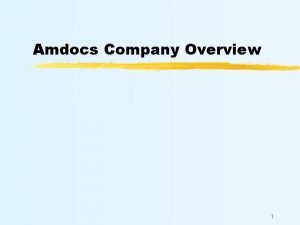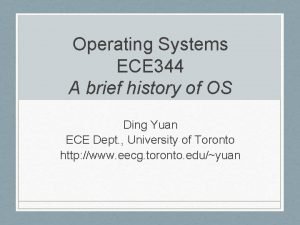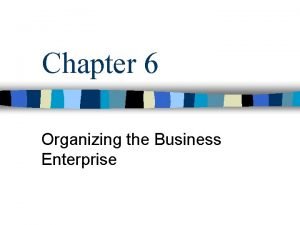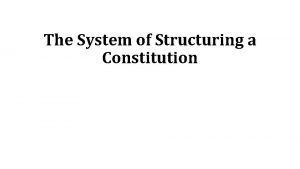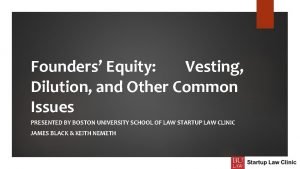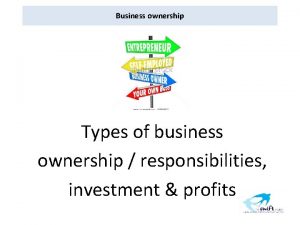Founders Equity Structuring the Ownership of Your Company





























- Slides: 29

Founders’ Equity: Structuring the Ownership of Your Company PRESENTED BY GILLIAN FISHER, SARA LEONARD, AND DAN MCCARTHY SPRING 2021

The Basics WHAT IS EQUITY, DECIDING WHO SHOULD RECEIVE IT, WHEN, AND WHY 2

What is Equity? • Equity is an ownership interest in a company • It takes different forms depending on the type of entity: • Corporation has stock (shares) • LLC has membership interest (percentage or units) 3

Who Can Receive Equity? • Founders • Based on skills, past or future work, and capital contributions • “Founders’ equity” is equity given out during formation of the company • Advisors • Should only get equity if they are indispensable • Key Employees • Investors 4

Why is Equity Important? 1. Compensation of founders and employees • Helps you attract and retain talented people • Replaces cash compensation with non-cash benefits • But equity is not a substitute for paying your employees minimum wage 2. Fostering an ownership mentality • Employees have a stake in the well-being of the company • Provides incentive for good work • Keeps recipients focused on long-term value 5

When Do You Allocate Equity? • Equity will likely be issued to all founders during formation • For issuing equity to newer team members, you can: • Issue Equity Earlier: • Attract talented team members to help advance company • Negotiations occur when stakes are lower • Company is protected through vesting • Issue Equity Later: • Team members have time to develop relationships • Avoid renegotiations when team dynamics change • More incentive to contribute to company 6

How Much Equity Does Each Founder Deserve? • Past contributions • Original idea • Intellectual property • Capital • Future contributions • Hard to measure, but important! • Relevant skills • Commitment • Resources to help your decision-making: • Mentors • Founder’s Pie Calculator • https: //www. andrew. cmu. edu/user/fd 0 n/35%20 Founders'%20 Pie%20 Calculator. htm; https: //foundrs. com/ 7

Entity Types and Equity Interests EQUITY BASED ON ENTITY TYPE: CORPORATIONS V. LLCS 8

Corporations • Types of stock for shareholders: • Common stock • Preferred stock • How becoming a shareholder impacts you: • Share of profits and losses through dividends • Double taxation 9

Limited Liability Companies (LLCs) • Membership interest in an LLC • Expressed in the form of a percentage or in units • Capital contribution • Cash or non-cash (i. e. , services) • How becoming a member impacts you: • Members share a percentage of profits and losses • Pass-through taxation 10

Equity Ownership in a Corporation AUTHORIZED V. ISSUED SHARES AND TYPES OF EQUITY COMPENSATION 11

Authorized v. Issued Shares • Authorized Shares: The number of shares that are authorized to be issued • Appears in certificate of incorporation • Maximum number of shares allowed to be issued • Clinic recommends 5, 000 with maximum of 10 M • Issued Shares: Number of authorized shares held by shareholders • Determines shareholder ownership 12

Ownership Example • 13

Types of Equity Compensation in Corporations Two main types of equity compensation for a startup: 1. Restricted stock 2. Stock options 14

Restricted Stock • What is it? • Shares of ownership in a corporation that come with conditions before the stockholder can transfer or sell the stock • Owner will have voting rights at the time of grant • Conditions can include: continuing employment for a certain amount of time or financial performance goals • Unvested shares subject to forfeiture 15

Stock Options • What are they? • The right to buy shares at current fair market value price at some future date • Employee will not have voting rights or any other rights associated with ownership until they exercise the stock option • The employee benefits because of the difference between option price and the market price at that future date • Types: • Incentive Stock Options (ISOs) • Non-Qualified Stock Options (NSOs) 16

Incentive Stock Options (ISOs) Only for employees working in the U. S. Gives employee the right to buy shares with tax breaks on the profit Profit taxed at the capital gains rate No tax paid upon exercising the option Employees must exercise their options within 10 years of receiving them To receive tax benefit, shares must be held for more than 1 year from the date of exercise and 2 years from the time of the grant • Maximum of $100 k in ISOs can be given out per recipient per year • Owners at certain income levels could have to pay an alternative minimum tax • • • 17

Non-Qualified Stock Options (NSOs) • Can go to employees, vendors, consultants or others not on company payroll • These stock options do not meet all the requirements by the internal revenue code to qualify as an ISO • Recipient pays ordinary income tax when exercising shares • Recipient also pays taxes upon selling the shares Example: if you have an option to purchase 100 shares for $10/share, at a time when the stock is valued at $15/share, the $500 gain is taxable as income at your normal income tax rate. Later, if the shares are sold for $2000, that $500 gain you receive upon selling those shares will be taxed at the capital gains rate. 18

Clinic Recommendation • Avoid employee stock options at the beginning • Challenging to implement properly • Better for employees to pay for stock up front • Expensive to administer and not worthwhile before funding • Issue equity to committed team members that are willing to invest time and effort into growing the company and will work for the company until an exit event 19

Vesting AN INTRO TO VESTING, VESTING SCHEDULES, AND ACCELERATION EVENTS 20

What is Vesting? What is its Purpose? • How vesting applies to: • Restricted Stock: Unvested shares are subject to forfeiture • Stock Options: Cannot exercise the stock options until vested • Vesting can alleviate potential issues with founders leaving the company or not performing up to expectations • Vesting requires founders to earn their equity • Two common methods of vesting: • Time-Based • Performance-Based 21

Time-Based Vesting • Vesting that occurs over time according to a specified schedule • A common vesting schedule is 3 -4 years with some having a 1 year “Cliff” • A “Cliff” is a set length of time before any shares vest • Example: On January 1, 2021, Founder A is granted 4, 800 shares subject to a 4 -year vesting schedule, with monthly vesting, and a 1 year cliff. • Prior to January 1, 2022: no shares are vested • On January 1, 2022: 1, 200 shares vest • 100 shares will vest each month, for the remaining 36 months, until Founder A is fully vested 22

Performance-Based Vesting • Vesting that occurs upon the achievement of certain, identified milestones • Examples: • First sale or shipment • Achievement of specified revenue figure • Threshold number of users • The milestones related to vesting should be clear and objective 23

Acceleration Events • Vesting provisions may provide for “acceleration” of vesting if one or more defined events occur • Two main types: • Single Trigger • Double Trigger • Common Acceleration Events: • • Sale of Company Merger Termination Change in Control 24

Restrictions on Sale AN INTRO TO RESTRICTIONS ON SALE AND COMMON TYPES 25

Overview of Restrictions on Sale • Limits on the ability to sell or transfer stock, even after shares are fully vested • Examples: • Right of First Refusal (ROFR): Can be for company, founder, or other shareholders • Co-Sale (aka Tag-a-Long) Right: Primarily benefits minority shareholder • Federal and State Regulations 26

Dilution WHAT DILUTION IS AND WHAT YOU SHOULD BE AWARE OF 27

Dilution • Generally, equity is diluted when the company issues new shares • Example: Founders A and B form a company. 10 M shares are authorized. 2 M shares are issued to both Founder A and Founder B. They each own 50% of the company. What happens if they issue 1 M shares to a new investor? • Good Dilution vs. Bad Dilution • Good Dilution - When the ownership percentage decreases due to new shares being issued and the value of the company increases • Bad Dilution - When the ownership percentage decreases due to new shares being issued and the value of the company does not increase 28

Questions? To meet with the Startup Law Clinic or learn more about our services, please visit us at: sites. bu. edu/startuplaw. Things we can help with: • Advice on equity allocation • Issuing founders’ equity and drafting equity agreements • Reviewing investment offers Thank you! 29
 Founders of christianity
Founders of christianity Who is the founder of disney world
Who is the founder of disney world Who founded samaritan's purse
Who founded samaritan's purse Edmodo founders
Edmodo founders Pony express clipart
Pony express clipart 5 major world religions and their founders
5 major world religions and their founders Gestalt psychology
Gestalt psychology Ebates ebay
Ebates ebay Irv robbins
Irv robbins Amdocs slogan
Amdocs slogan Unix founders created another os bell
Unix founders created another os bell Founders effect
Founders effect Qnet founders
Qnet founders Structuring system requirements
Structuring system requirements Structuring arguments
Structuring arguments Morphology
Morphology Thinning and thickening in image processing example
Thinning and thickening in image processing example Time structuring in transactional analysis
Time structuring in transactional analysis Supply chain drivers and metrics
Supply chain drivers and metrics Time structuring in transactional analysis
Time structuring in transactional analysis Child ego state
Child ego state Reverse triangular merger
Reverse triangular merger Direct and indirect observation
Direct and indirect observation Global tax structuring
Global tax structuring Structuring organizations for today's challenges
Structuring organizations for today's challenges Organizational structuring
Organizational structuring Mixed departmentalization
Mixed departmentalization Example of dominance structuring
Example of dominance structuring Framework for structuring drivers
Framework for structuring drivers Islamic structuring
Islamic structuring









